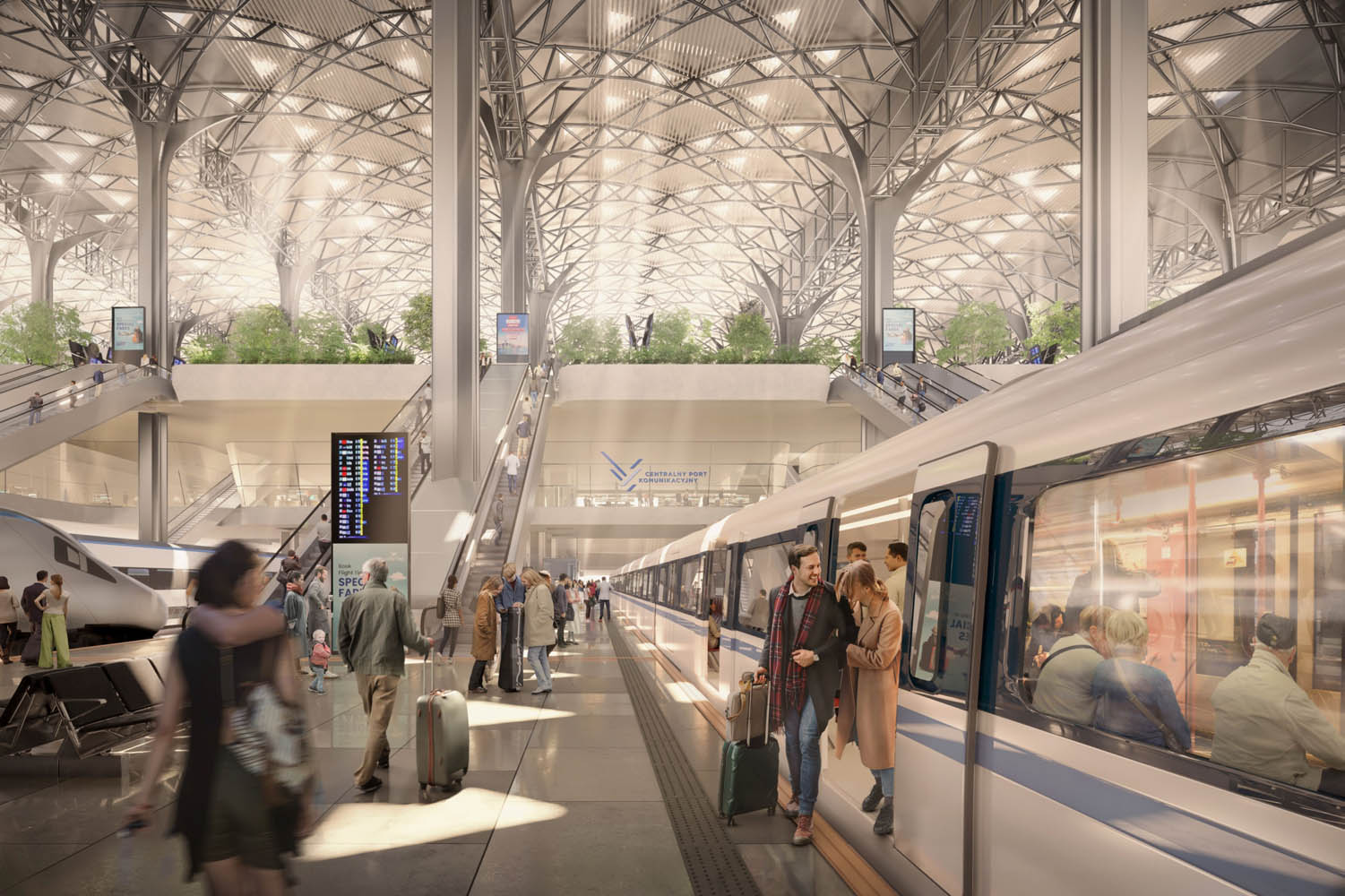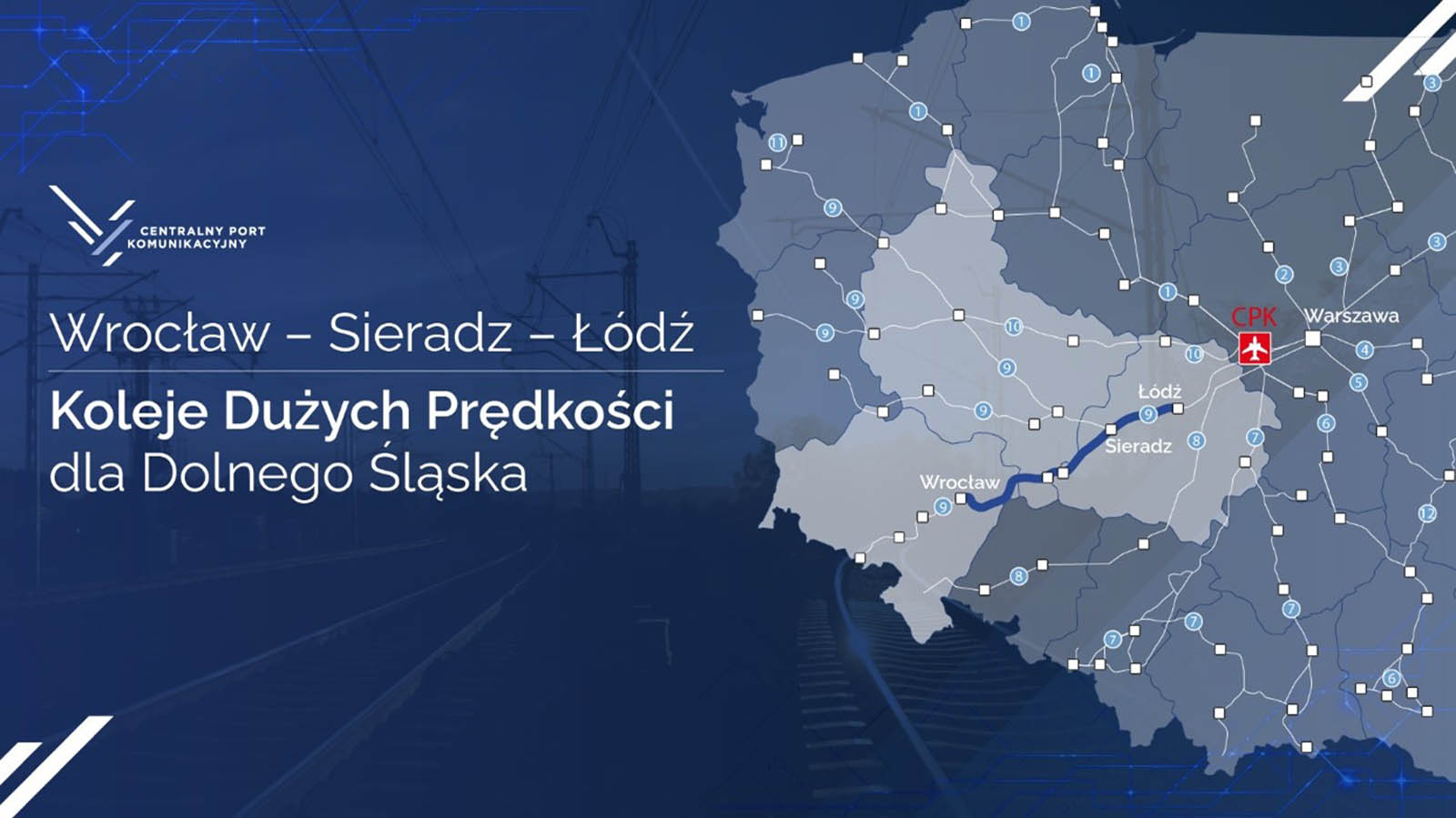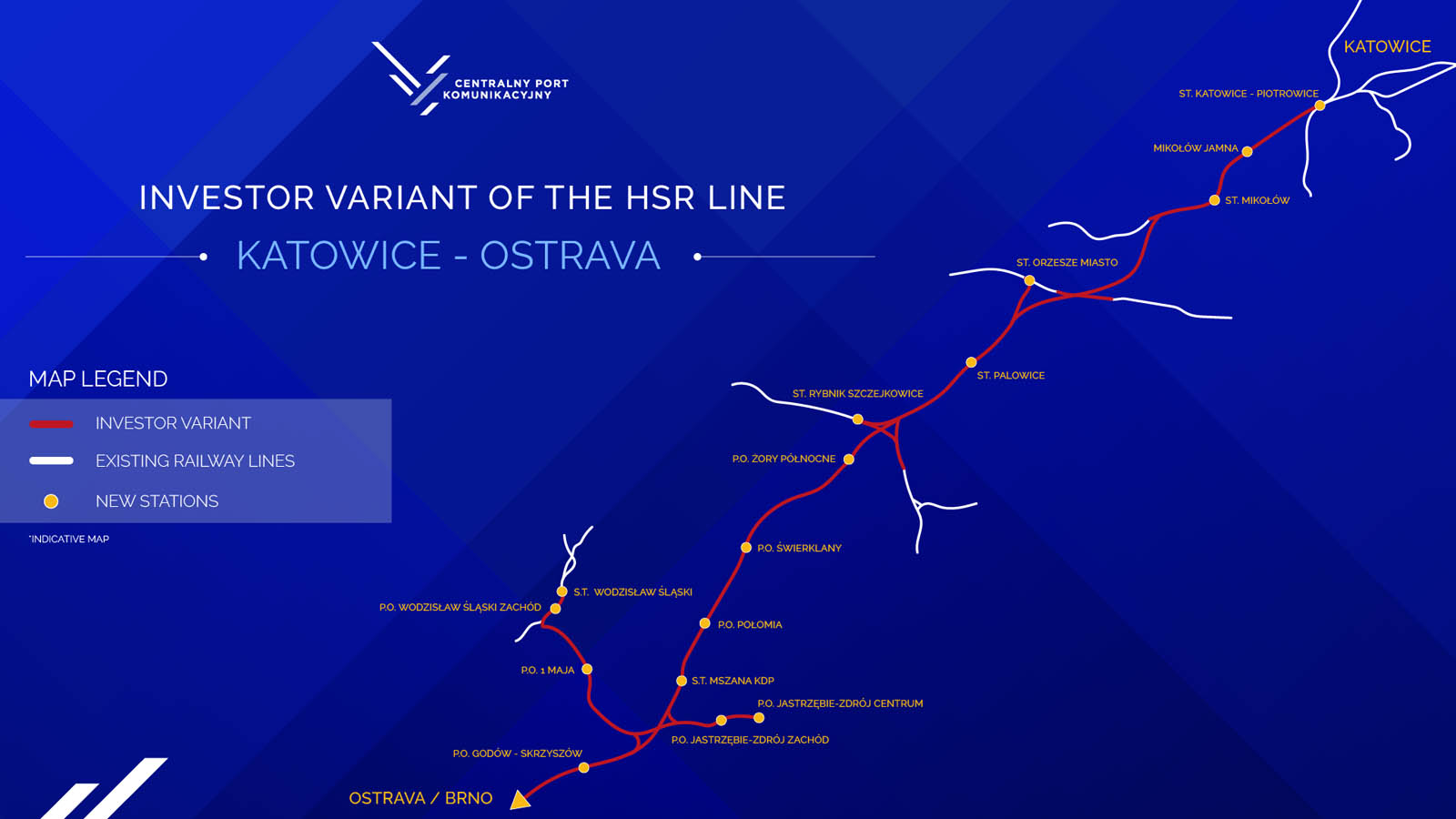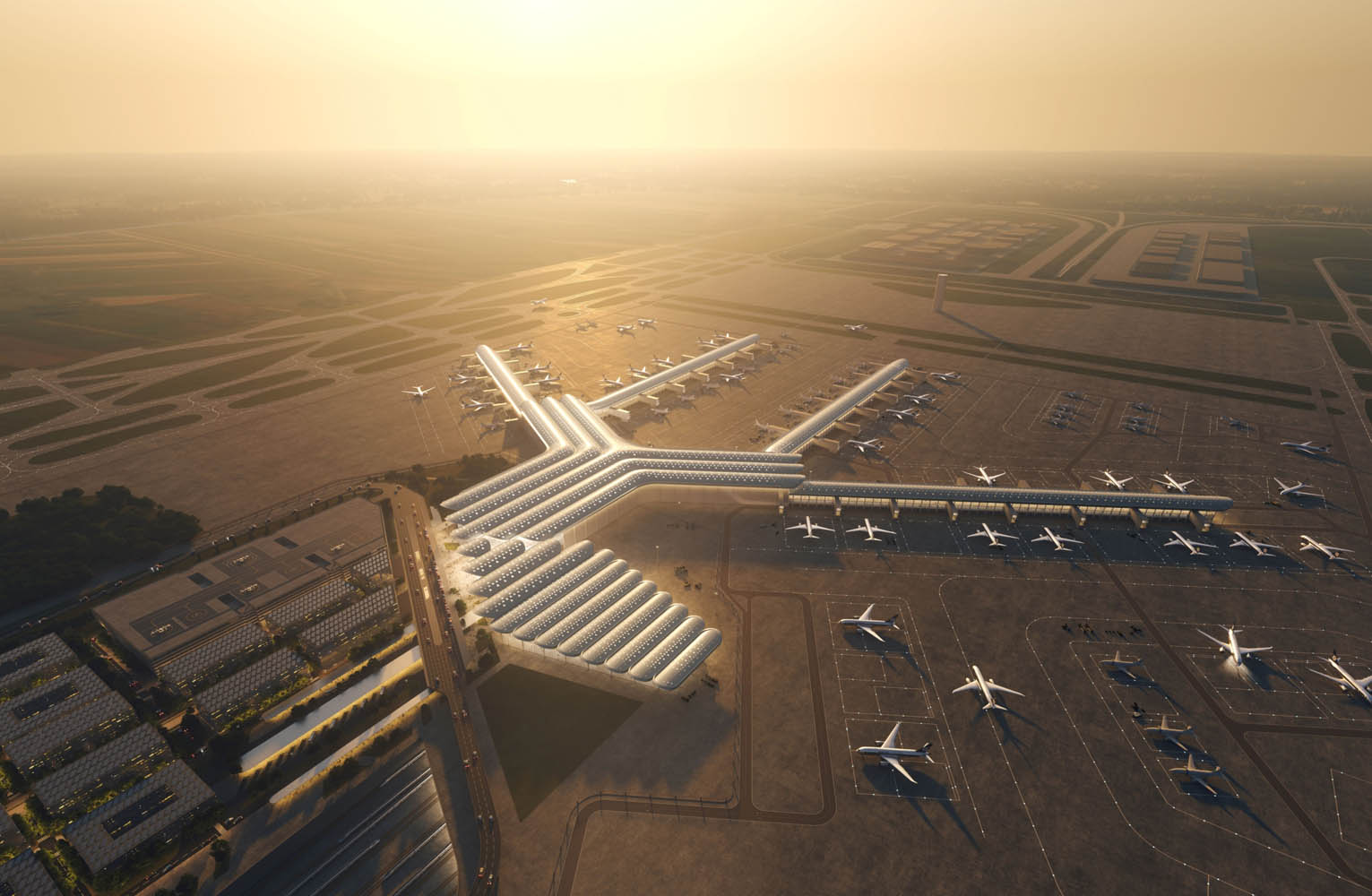Centralny Port Komunikacyjny (CPK) will be an engine for the development of the Polish economy by attracting foreign investments such as from France and Australia which are ready to invest several billion zlotys in the airport, resulting in a high rate of return.
The world-renowned firm EY estimates that CPK’s infrastructure will generate almost PLN 200 billion (EUR 44.7 billion) by 2060 from cargo handling revenues alone. Since the mid-2030s, thanks to CPK, the additional annual revenue for the state budget from customs duties and VAT will exceed one billion zlotys. Like any investment, it requires some expenditure today but will be profitable years later. This is also confirmed by a Kearney study indicating that CPK will create as many as 290,000 new jobs by 2040. In recent days, the European Union has confirmed another subsidy for the CPK rail investment worth almost PLN 290 million (almost EUR 64 million) from the Connecting Europe Facility (CEF) to prepare the construction of the 140 km high-speed railway line between Warsaw and Łódź which will be connected to the new CPK airport.
In this connection, the CPK Capital Group has been gradually built up over a long period. It brings together expertise and experience in managing the airport and the associated infrastructure. It already includes Torpol (which has been involved in the comprehensive modernisation and construction of railway infrastructure for more than 30 years) and Polskie Porty Lotnicze (PPL).
Foreign investors understand this very well. France’s Vinci Airport is a world leader in operating similar infrastructure projects. It is active in 120 countries with 270,000 employees and operates 65 airports. Australia’s IFM manages more than USD 140 billion in assets and 17 airports in various countries. Both companies are convinced that the construction of CPK makes sense, and their joint bid has been selected in the competition for the strategic investor of CPK. Lotnisko, which will carry out the construction and manage the new Polish airport. Poland will retain control of the strategic infrastructure, as it will acquire no less than 51 per cent of the shares in it. Investors may take up to 49 per cent of the shares, but this will still mean attracting around PLN 8 billion (EUR 1.8 billion) in direct investment to Poland.
EU support for CPK railway investments
The new modern airport and railway station are expected to serve not only Poles but the 180 million inhabitants of the Central and Eastern European region, where there is still no such developed infrastructure. This is recognised by Brussels, which is already funding some of the CPK’s rail projects.
The Railway Programme of the CPK envisages the construction of about 2,000 km of new lines leading from 10 directions to the centre of Poland: Warsaw and the CPK airport. The trains will be able to run at speeds of up to 250 km/h, and up to 350 km/h in the future. More importantly, the project fits perfectly into the EU’s transport objectives and climate policy. That is why Brussels is co-funding these investments and has already granted more than PLN 400 million for the development of the new CPK railway lines within the framework of several projects. The “Y” high-speed railway line and cross-border sections to the Czech Republic) have already been included by the EU in the TEN-T Trans-European Transport Network.
The takeover of long-distance passenger traffic by HSR lines being designed and built by CPK is going to free up some capacity of the existing railway lines. Additional capacity will be available for freight transport. Also, most of the railway lines implemented by CPK will serve mixed traffic.
For intermodal transport to become fully competitive with road transport, in addition to increasing speeds, the cross-border continuity of railway lines and connections within the EU is essential. The continuity means cross- border comparability of infrastructure standards as well as the availability of multisystem locomotives that are crucial to eliminating stops at border crossings particularly in transport processes that cross multiple borders.
For the 1,500 km of new CPK railway lines, feasibility studies (technical-economic-environmental studies) are either ready or in preparation and the routes have been consulted with local authorities and residents. The following sections: Warsaw – CPK – Łódź, Łódź – Wrocław, Sieradz – Poznań, Łętownia – Rzeszów and Katowice – Ostrava already have the selected investor variants, i.e., the optimal routes.
The most advanced CPK railway investment in terms of preparations is the long-distance HSR tunnel in Łódź, the construction of which will start this year. In November 2021 CPK signed a contract with the consortium of Metroprojekt and SUD Architekt Polska to design it. The tunnel will have a length of 4 km starting at Łódź Fabryczna station and exiting to the south-west of the Łódź Kaliska station in the vicinity of Retkinia and the existing railway line No. 14. The new structure will be used by long-distance trains, mainly providing high-speed services. The 12.6-metre inner diameter tunnel will be made with 55 cm prefabricated reinforced concrete rings. Łódź high-speed tunnel is one the city’s infrastructure priority projects and is part of the Y-shaped HS rail system connecting Warsaw and Łódź with Poznań and Wrocław. The 140 km Warsaw – CPK – Łódź high-speed project has received EUR 64 million CEF financing representing 85% of the eligible costs of EUR 75 million for the full project documentation, including the construction project, and the documents needed to obtain water permits and a location decision for the new high-speed railway. This line is part of the TEN-T North Sea – Baltic Sea European Transport Corridor.
In 2021, CPK signed an agreement for the feasibility study for the construction of Łódź – Wrocław high-speed rail on the Łódź – Sieradz section. The contract has been awarded to a consortium comprising Multiconsult Polska, Arcadis, Transprojekt Gdański and Idom Inżynieria. Łódź – Wrocław will be 200 km long and in 2022 CPK presented an investor variant for the line. A consortium comprising Multiconsult Polska, Arcadis, Idom, Doradztwo and Transprojekt Gdański was awarded the contract for technical, economic and environmental study covering two sections of the line. The technical, economic and environmental study covers the Łódź – Sieradz (line no.8) and Sieradz – Kępno – Czernica Wrocławska – Wrocław Główny (line no.86) routes. According to the schedule, the first construction works on the Sieradz – Czernica Wrocławska section are to start in 2024.
In 2022, CPK selected the contractor for technical, economic and environmental study for the 42 km Łętownia – Rzeszów section, part of the so-called spoke no. 6. The consortium of BBF, Ingerop Polska and Safege won the contract which is expected to be completed by the end of this year. On this line, the trains will run at speeds of up to 250 km/h.
The 70 km Katowice – Ostrava line is part of Visegrad Group V4 rail plan and the Three Seas initiative, and at the same time one of the key sections of the railway lines built in Poland by CPK. It is an important part of the EU’s Trans-European Transport Network (TEN-T) connecting Katowice, Warsaw and Krakow with Brno, Prague, Bratislava, Vienna and Budapest. In June 2023, CPK awarded a Korean consortium comprising Korea National Railway (KNR) and Dohwa Engineering a EUR 30 million contract to develop the design documentation of this line. On the Polish section, the trains will run at speeds of up to 250 km/h.
An important step for the development of rail connection in the Three Seas Region was taken in January 2023 when CPK and the rail infrastructure companies RB Rail and Správa železnic from Czechia signed a cooperation agreement to develop high-speed connections in this region. the investment to create high-speed and interconnected corridors is estimated at EUR 60 billion with an economic effect of EUR 120 billion. The network would be created by 4,500 km of rail lines which include a 1,700 km corridor between Tallinn, Warsaw, Katowice and Budapest, as well as a 1,500 km Tallinn – Warsaw – Wrocław – Prague route which will include 400 km along CPK’s “spoke” no. 9.
In 2028 the launch of the first phase of CPK airport and the first section of the Warsaw – Łódź high-speed line is expected, the modernised line in Poland (Lithuanian border via Białystok to Warsaw) part of the Rail Balica corridor is also planned by PKP PLK to be put into service, while the entire Rail Baltica will become operational in 2030 with trains running from Tallinn, Riga, Kaunas, Vilnius to the Polish border.
The most important decisions and permits are already in place
The CPK company has already applied to the Mazowieckie Voivodeship (Masovian Voivodeship) for a location decision for the new interchange hub. The speed of processing the application depends on the Voivode, but it is assumed that it is possible to obtain a decision in the first quarter of next year. This will be a straightforward path to the building permit application.
The company already has an environmental decision with immediate enforceability issued by Poland’s Regional Directorate for Environmental Protection (RDOŚ), an approved Master Plan and even a promise from the Civil Aviation Authority to establish an airport.
Importantly for the financing of the project, the second phase of the Multi-Annual Programme, which will cover the years 2024 – 2030, has been adopted. It guarantees the funds necessary to continue the CPK project, including the design and construction works of the CPK Airport, as well as related key investments, including roads and railways. The total value of the programme is PLN 155 billion (EUR 34.7 billion).
Large-scale geological drilling, demolition or relocation of people who have voluntarily sold their properties has already been underway for months on the site of the future CPK hub. This is thanks to the introduction of the Voluntary Purchase Programme for the first time in history. Under the DAP, the company has already purchased almost 1,100 hectares of land for investment. At the same time, notarial deeds are being prepared and talks are underway for further properties. As the company is paying as much as 140 per cent of the value of the buildings and 120 per cent of the land, more than 1,300 owners owning almost 3,600 hectares have so far indicated their willingness to sell their properties to CPK. Contrary to repeated untruths, the number of people expropriated for the project so far is: zero.
The opening of the first stage of CPK airport, which will see two runways and infrastructure with a capacity of up to 40 million passengers, is planned for 2028. The conceptual design of the airport terminal as well as the train and bus stations are 100 per cent ready, and the construction project is in advanced preparation, being prepared by Foster + Partners, a British office which has previously designed airports in Hong Kong, Beijing and Doha, among others. The creation of a new airport is necessary, among other things, due to the exhausted capacity of Chopin Airport – the largest port in Poland, which is starting to become clogged, cannot operate at night and, in addition, has no room for significant expansion due to its dense development.
Share on:







